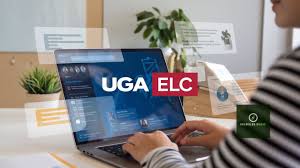Table of Contents
Introduction to UGA eLC (eLearning Commons)
In response to fundamental shifts in education, the University of Georgia offers UGA eLC, a valuable resource to support learners throughout their educational endeavors. eLearning Commons, as the UGA eLC is known, is designed to enrich the academic experience with advanced resources. eLC provides tailored pathways to all types of learners, ensuring every student, whether a novice in their first semester or an advanced student in advanced coursework, is supported to achieve their academic aspirations. I will cover in this session the transformational impact of UGA eLC on academic life at the University of Georgia.
The Benefits of Using UGA eLC

eLC at UGA provides several advantages that assist students in managing their academic responsibilities. During their balancing classes, work, and personal commitments, students can retrieve course materials that are seamlessly enhanced. The platform’s additional features offer provisions that enhance communication. Interactions via discussion boards and the messaging modules are not limited to learners and extend to instructors as well, which assists in fostering at least a semblance of digital communitarianism.
Furthermore, UGA eLC presents users with an array of tools to address various pedagogical needs. The active provision of video lectures, interactive quizzes, and other relevant materials in downloadable formats fosters active learning and caters to various user preferences and needs. To all learners, seasoned and new, the eLC guarantees a simple interface that provides effortless navigation. Such low-friction interaction not only invites learners to actively engage with the vast array of resources available on eLC but also does so devoid of the burden of technological stress or frustration.
Key Features and Tools Available on UGA eLC
Educational Learning Center (UGA eLC)’s eLearning portals provide materials and resources, assisting the students both academically and technically. For example, the course management system facilitates the organization of instructional materials for instructors, which, in turn, enables streamlined access for students. Through a central repository, students access lecture notes, readings, and assignments. Centralized access eliminates redundancy, optimizes organization, and enhances navigation.
Another notable function is the discussion board. This functionality inspires learners to collaborate and participate in meaningful interactions on many issues. The integrated calendar is also useful for tracking critical dates. Similar to the discussion board, this feature also aids learners by offering cognitive reminders, which, in turn, lowers mental workload and aids in the management of time.
Through the quizzes and surveys feature, instructors are able to provide and assess learners’ understanding of the instructional materials. Feedback enables the learner to focus on areas that require more attention, thereby increasing the value of the provided instructions.
How UGA eLC Enhances Student Learning
The UGA eLC system enhances the educational journey of students by integrating an educational portal through which the learners can access course materials, anytime, anywhere, 24/7. Such convenience inspires learners to take the initiative, broaden the educational reach, and augment the scope of the resources accessible to them. The invaluable value of interaction through forums warrants emphasis. Students articulate, inquire, and receive answers almost instantaneously. This type of engagement nurtures fundamental community development, which contributes to the enhancement of the academics offered.
Additionally, UGA eLC uses a blended learning approach by incorporating videos and quizzes, which caters to various learning styles, enhancing the materials that need to be covered. Different and varied approaches to instructional paradigms improve motivation and attainment of critical concepts. The eLC system’s other resources and tools further enhance the deep, yet instant, access to materials within a few seconds. The integration amplifies the level of integration and connectedness and streamlines the already efficient workflows, enriching the functions of the system; thus, the students can focus their energies on learning.
Success Stories from Students Using UGA eLC
Students report significant achievements through eLC at UGA. One of the students, Sarah, struggled with time management in her coursework. She now uses the course calendar feature to schedule her deadlines and has noted substantial gains in productivity. Another student, Jake, explained to me how he solved the problems posed by group assignments. The UGA eLC discussion forums made it simple for him to participate in group discussions with his classmates.
This eLearning tool has widened his education by developing his collaboration and communication skills. In addition, eLC proved to be quite useful for Maria, who found exam preparation resources and other materials for revision. Maria made use of the resources and quizzes posted by her teachers to master more challenging concepts, which she found difficult.
The narratives that his peers shared illustrate the range of the eLC system’s applications for students. All the stories showcased the considerable adaptability of the system designed to enhance academic performance and student engagement.
Tips for Maximizing the Use of UGA eLC
Prioritizing accomplishing goals for each section ensures mastery of all features on UGA eLC. Make use of all available tools. Self-paced exploration aids retention associated with personal milestones from previous sessions. Reach out to your peers and instructors, and interact with them on boards as active participants. Engagement fosters understanding and incites meaningful dialogue.
Join or form study groups to use eLC UGA’s collaborative features, such as peer reviews. Enhanced interaction fosters learning. The UGA eLC mobile application provides learning resources in a convenient and timely fashion. Obligation and coursework can be strikingly well-balanced. Stay in the loop of your instructors’ commented changes with advanced topics such as dynamic tasks or dates.
Future Developments and Improvements for UGA eLC
As eLC at UGA continues to evolve, its future development considerations stand out, such as the implementation of novel analytics, which will fully equip instructors to monitor student engagement, thereby enabling instruction to be better tailored to the students.
Improving mobile accessibility is also another anticipated improvement. Given the understanding that students are increasingly using smartphones and tablets for classwork, enhancing the eLC for a mobile interface would provide significantly greater ease and mobility.
Further partnerships with educational technology firms promise submission and feedback tools that transform and streamline workflows, enhancing academic productivity. These innovations seek to automate processes, methodically alleviating academic burdens. Intuitive spacing and structuring of interfaces empower effortless navigation for UGA eLC by faculty and students. These upgrades stand to reshape the learning experience as one interacts with sophisticated learning tools.
Conclusion UGA ELC
The eLearning Course Management System, eLC at UGA is critical for the students in managing their studies. eLC has advanced its architecture to offer a wide array of tools for learning as well as resources that enable self-directed study. Enhanced organization and participation articulated by the users demonstrate the eLC’s wide array of functionalities.
With such persistent advancements by the university, students are likely to receive additional features aimed at amplifying their experience. eLC’s constantly evolving features are indicative of the university’s ongoing commitment to learning technologies, solidifying UGA’s position as a frontrunner in the field. The online integrated systems boost students’ academic performance and cultivate a sense of community. With the right strategies, students can achieve their academic and career objectives not only at UGA but throughout their lives.

 fintechzoom.com US Markets Today: Stocks Surge Amid Investor Optimism
fintechzoom.com US Markets Today: Stocks Surge Amid Investor Optimism  fintechzoom com cac 40: Rises on Strong Earnings Reports
fintechzoom com cac 40: Rises on Strong Earnings Reports  fintechzoom.com nasdaq: Soars on Tech Stock Rally
fintechzoom.com nasdaq: Soars on Tech Stock Rally  fintechzoom.com economy: Rebounds on Strong Job Growth
fintechzoom.com economy: Rebounds on Strong Job Growth  fintechzoom.com bitcoin: Crashes on Market Panic
fintechzoom.com bitcoin: Crashes on Market Panic  fintechzoom.com russell 2000: Gains Reflect Market Confidence
fintechzoom.com russell 2000: Gains Reflect Market Confidence